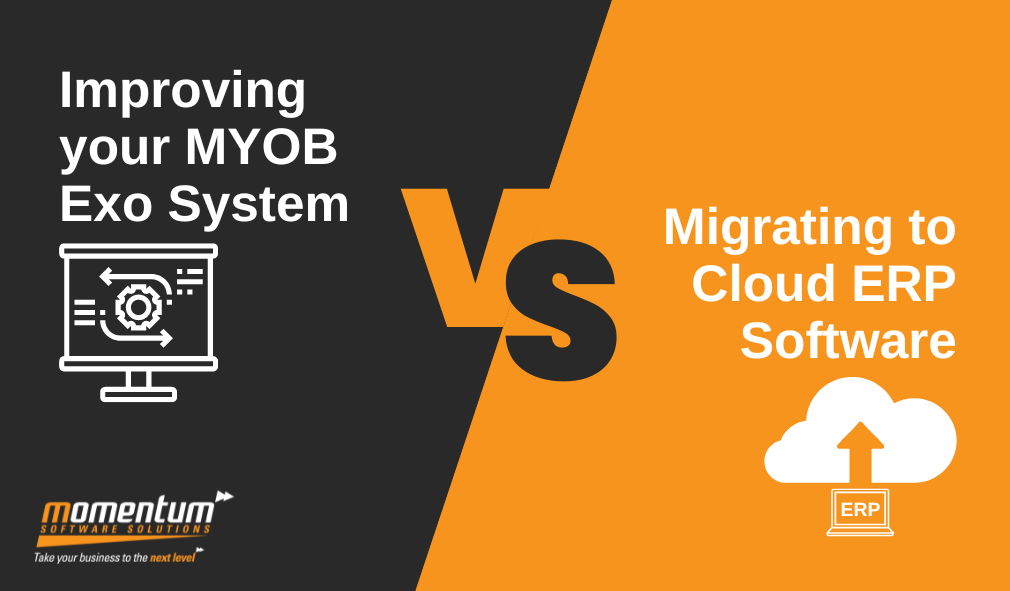If you’ve been using MYOB Exo for a long time, moving to the cloud might seem like an overwhelming process. One critical decision that businesses often grapple with is whether to make improvements to their existing MYOB Exo system or take the leap and migrate to a cloud ERP solution. This decision requires careful consideration of various factors, including business needs, scalability, cost, and technological advancements.
The Case for Improving MYOB Exo
Familiarity and User Adoption:
Employees are already familiar with the MYOB Exo system, reducing the learning curve associated with a new platform. Upgrading or enhancing MYOB Exo may require minimal retraining, ensuring a smooth transition for your team.
Cost-Effective:
Upgrading or improving MYOB Exo is often more cost-effective than migrating to a completely new system. Businesses can leverage existing infrastructure and investments, minimizing additional expenses.
Customization & Add-on Options:
MYOB Exo has the ability to integrate with a range of add-on solutions to improve functional gaps in your system and further automate processes within your business.
Data Security:
Some businesses, particularly those in highly regulated industries, may have concerns about data security in the cloud. Improving MYOB Exo allows them to maintain control over their data on-premises.
The Case for Migrating to Cloud ERP
Scalability and Flexibility:
Cloud ERP solutions provide scalability, allowing businesses to easily adapt to changing demands and expand their operations without the need for significant infrastructure investments.
The flexibility of cloud solutions enables remote access, facilitating a more agile and collaborative work environment.
Advanced Features and Integration:
Cloud ERP solutions often come with advanced features, improved analytics, and better integration capabilities, providing businesses with a more comprehensive and up-to-date toolset.
Integration with other cloud services and third-party applications can enhance overall business efficiency.
Automatic Updates and Maintenance:
Cloud ERP systems receive regular updates and maintenance from the provider, ensuring that businesses always have access to the latest features and security patches without the need for manual intervention.
Cost Savings in the Long Run:
While the initial investment in migrating to a cloud ERP solution may be higher, businesses can experience long-term cost savings by eliminating the need for extensive on-premises infrastructure and reducing IT maintenance overhead.
Competitive Market Advantage:
As an increasing number of companies embrace cloud technology and leverage real-time data, maintaining a competitive edge has become a formidable challenge. Without comparable forecasting and reporting capabilities to those of their competitors, businesses risk resorting to mere guesswork rather than making informed decisions grounded in real-time data.
Ultimately, the decision to improve MYOB Exo or migrate to a cloud ERP solution depends on the unique needs and priorities of each business. Those looking to maintain familiarity, control, and minimise immediate costs may find enhancing MYOB Exo a suitable choice. On the other hand, organisations seeking scalability, flexibility, advanced features, and long-term cost savings may find migrating to a cloud ERP solution to be a more strategic move.
Momentum have successfully migrated numerous businesses from MYOB Exo to MYOB Advanced. These clients have seen great functional improvements in their business and are already reaping the benefits of cloud software.
Momentum is here to help guide you through whichever path your business chooses. Please contact us at enquiries@momentumss.com.au or phone (07) 5479 1877 to speak with one of our solution experts.
